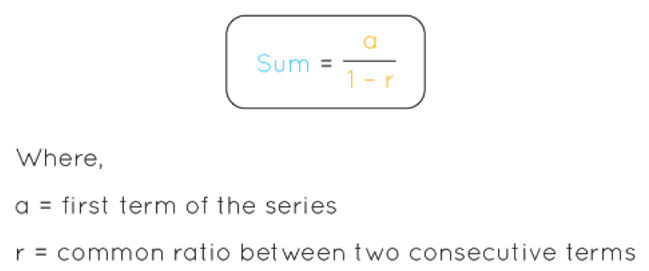
The Infinite Series Formula is a valuable tool for calculating the sum of a sequence with an infinite number of terms. It is commonly applied to two main types of infinite series: arithmetic series and geometric series.
Arithmetic Series: An arithmetic series is a sequence in which the difference between each consecutive term remains constant. The infinite series formula allows us to efficiently determine the sum of such a series.
Geometric Series: A geometric series, on the other hand, is a sequence in which the ratio of consecutive terms to the preceding term remains constant. The infinite series formula is also applicable in this context, enabling us to find the sum with ease.
This formula is a convenient way to compute the sum of an infinite series quickly. To gain a better understanding of the infinite series formula, let's explore some solved examples.
What Is Infinite Series Formula?
The formula for finding the sum of an infinite geometric series is indeed a valuable tool when dealing with series that extend to infinity. Here's a recap of the formula and some additional information:
Infinite Geometric Series Formula:
If -1 < r < 1, the sum of an infinite geometric series can be calculated as:
Sum = a / (1 - r)
Where:
a represents the first term of the series.
r is the common ratio between two consecutive terms, and it should satisfy the condition -1 < r < 1.
It's important to note that if the common ratio r is greater than 1, the sum does not exist because the series does not converge. In such cases, the series diverges and doesn't have a finite sum.
Additionally, in the case of an infinite arithmetic sequence (an arithmetic series with an infinite number of terms), the sum can be infinite or negative infinity, depending on the value of the common difference d:
The sum of an infinite arithmetic sequence is ∞ (positive infinity) if d > 0.
The sum of an infinite arithmetic sequence is -∞ (negative infinity) if d < 0.
Now, let's take a look at a few solved examples using the Infinite Geometric Series Formula and the concepts of infinite arithmetic sequences:
Example 1: Infinite Geometric Series
Suppose you have a geometric series with the first term a = 2 and the common ratio r = 1/3 (-1 < 1/3 < 1). You want to find the sum of this series.
Using the formula:
Sum = a / (1 - r)
Sum = 2 / (1 - 1/3)
Sum = 2 / (2/3)
Sum = 3
So, the sum of this infinite geometric series is 3.
Example 2: Infinite Arithmetic Sequence
Consider an infinite arithmetic sequence with the first term a = 5 and a common difference d = -2 (d < 0). You want to find the sum of this series.
Since d is negative, the sum of this infinite arithmetic sequence is -∞.
These examples illustrate how the Infinite Geometric Series Formula and the properties of arithmetic sequences can be applied to calculate the sum of infinite series.

Also Check – Polynomials Formula
Infinite Series Formula Example
Example 1: Using the infinite series formula, we can determine the sum of the infinite series: 1/4 + 1/16 + 1/64 + 1/256 +⋯
Solution:
Given: First term (a) = 1/4
Common ratio (r) = (1/16) / (1/4) = (1/64) / (1/16) = 1/4
To find: The sum of the given infinite series
If -1 < r < 1, we can use the formula: Sum = a / (1 - r)
Now, let's apply the values to the infinite series formula:
Sum = (1⁄4)/(1-1⁄4)
Sum = (1⁄4)/(3⁄4)
Sum = (1/4) * (4/3)
Sum = 1/3
Answer: The sum of 1/4 + 1/16 + 1/64 + 1/256 +⋯ is 1/3.
Also Check – Quadrilaterals Formula
Example 2: Using the infinite series formula, find the sum of the infinite series: 1/2 + 1/6 + 1/18 + 1/54 + ⋯
Solution:
Given: First term (a) = 1/2
Common ratio (r) = (1/6) / (1/2) = (1/18) / (1/6) = 1/3
To find: The sum of the given infinite series
Since -1 < r < 1, we can use the formula: Sum = a / (1 - r)
Now, let's apply the values to the infinite series formula:
Sum=(1⁄2)/(1-1⁄3) Sum=(1⁄2)/(2⁄3)
Sum = (1/2) * (3/2)
Sum = 3/4
Answer: The sum of 1/2 + 1/6 + 1/18 + 1/54 + ⋯ is 3/4.
Example 3: Evaluate the series 3 + 7 + 11 + ....
Solution:
Given: First term (a) = 3, Common difference (d) = 4, and the number of terms (n) tends to infinity (∞).
Here, the common difference (d) is greater than 0. Therefore, the sum of this infinite arithmetic series is positive infinity (∞).
Answer: The series 3 + 7 + 11 + .... tends to positive infinity (∞).
Also Check – Data Handling Formula
Infinite Series Formula Applications
The Infinite Series Formula is a powerful mathematical tool used to calculate the sum of an infinite series, particularly for geometric series when the common ratio is between -1 and 1. Here are some common applications of the Infinite Series Formula:
- Compound Interest: The formula can be used to calculate the future value of an investment or loan when the interest is compounded continuously. This is typically used in financial calculations.
- Physics and Engineering: In physics and engineering, you may encounter series in various contexts, such as waveforms, electrical circuits, and thermodynamics. The Infinite Series Formula is applied to model and analyze these systems.
- Probability and Statistics: The formula is useful in probability and statistics when dealing with distributions, particularly in cases involving continuous random variables. It helps calculate probabilities and expected values.
- Signal Processing: In signal processing, the formula is applied to analyze signals and filter data. It's used in fields like digital signal processing and telecommunications.
- Calculus: In calculus, the formula is often used to find the sum of an infinite geometric series when integrating functions, especially when working with power series and Taylor series expansions.
- Computer Science: In computer science, algorithms may involve summations of series, and the formula can be used to optimize calculations and estimate the behavior of algorithms, especially when analyzing the complexity of algorithms.
- Number Theory: In number theory, the Infinite Series Formula is used to prove various mathematical results and properties of numbers.
- Economics: Economic models often involve the use of series to represent the behavior of economic variables over time. The formula is applied to analyze and forecast economic data.
- Chemistry: In physical chemistry and quantum mechanics, series are used to describe the behavior of particles and molecules. The formula may be applied to simplify calculations and understand the behavior of these systems.
- Finance: In finance, the formula can be used to calculate the present value of future cash flows, as well as to understand the behavior of financial instruments such as annuities and perpetuities.
- Machine Learning: In machine learning, series can arise in various algorithms and data processing tasks. Understanding and applying the Infinite Series Formula can be beneficial in model training and analysis.
These are just a few examples of how the Infinite Series Formula is applied in various fields. Its versatility makes it a fundamental concept in mathematics and its applications extend to a wide range of scientific, engineering, and financial disciplines.
Infinite Series Formula FAQs
Q1. What is the Infinite Series Formula?
Q2. When is the Infinite Series Formula applicable?
Q3. Can the Infinite Series Formula be used for arithmetic series?
Q4. What is the significance of the common ratio in the formula?
Q5. How is the formula used in real-life applications?










